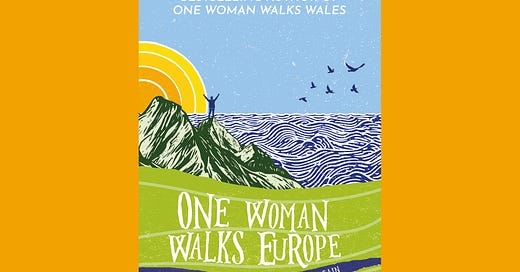Book Review: 'One Woman Walks Europe – From Wales to Ukraine and Back Again'
The epic journey of landing on your feet, one step at a time
Ursula Martin was diagnosed with cancer. Her unlikely solution to this life-changing decision: travel by foot across her native Wales in 17 months, documenting the sights and sounds in her journey to find self, peace, and discovery.
If you’re looking synchronicity in the face right now, Martin (a hitchhiking veteran) has helped that narrative by beginning her second memoir One Woman Walks Europe in the Ukraine, in September 2018. The higher-style living and accouterments of accommodations in the central district of Kyiv give way to the rusting vehicles and shuffling figures as she makes her way out and onto her path to the Carmathian Mountains and Romania.
Igor’s story forms a small piece of the tumbled history of Ukraine, a country which has been torn and divided over and over, always pulling at its ragged edges to form a semblance of centre.
As Martin arrives in Romania, she notes the distinct and otherworldly feeling from the Ukraine, the utter modernism juxtaposed against the threadbare lives she witnessed just days previous. Initially there to receive a care package, she stayed at her initial stop too long and plunged headlong into the bitter cold of winter. Christmas in Bucharest with her brother and the trek onward, planning day to day, into the unknown was an unspoken act of bravery.
The unintended short-term companionship of a stray dog also brings out the many reasons why Martin has chosen this life: the dysfunctional childhood, the lack of a strong partner, the cancer… it’s all harnessed into a rucksack, walking sticks, and the fortitude of character that has her crossing the Danube River into Bulgaria. Through a birthday celebration, it was the summer season, far off in the distance that kept Martin’s mindset on her walk. Battling foot pain, back pain, and the rucksack that shouldered her life, she moved onward.
Her observations with regards to the UK leaving the EU are colored by her interactions with locals. As she says in one passage, its themes repeated often, “We plundered the world in the time of empire and now we can’t allow those subjects equality because they’ll claim a share of what we have gathered.”
There were the bus trips that made their way to Greece to meet an old friend. Turning back to make the way into Serbia. Villages nearly empty from the bombings 20 years previous. A detour into Kosovo, a planned visit back home for a check-up (cancer free!), and a gig at the Glastonbury Festival had Martin heading back to Europe in the summer of 2019. While a brief bout of gastrointestinal illness in Bosnia gave Martin pause to consider stopping — “I was finally following the challenging route and it would be so easy to bow out, pretending it was for my own safety” — she recovers, manages a bear encounter and observes the community talk among the people regarding the Serbs and Bosnians in that area during the genocide from 1992-1995.
Martin remained connected to the world through extended stays and communication with her mobile phone to family back in Wales. What those connections would mean later on, Martin and the rest of the world had no clue.
On the 27th February 2020, I hugged Aurellio as I left his house to take the train back to the small village high above the valley and the busy roads down to Genoa. I didn’t know that it would be the last time I’d touch anyone for almost five months.
It was in France that Martin first went into lockdown, a mind-numbing time filled with uncertainty and anxiety. By the end of June 2020, she resumed her walk, and poeticly, her ascension into the Pyrenees is tinged with emotion, fortitude, and endurance. It is during this passage that Martin fully embraces everything that is thrown at her, whether it be the snow, the wind, or the body aches, coupled with uncertainty, is part of the relatability – the human aspect – that brings this narrative into full light.
Forced into a second lockdown in France, Martin has to wait until just before Christmas before she can leave for Spain. There she is welcomed by those who can shelter ‘pilgrims,’ the fellow travelers, similar to Martin in their personal goals and life quests. When she is finally home in Wales, greeted by well-wishers and taking periods of time to settle in, she reflects on not only her walk but her life’s journey with careful consideration.
I have learnt to identify and reject what doesn’t work for me, to be more at peace with who I am, in heartfelt integrity.
One Women Walks Europe — From Wales to Ukraine and Back Again by Ursula Martin is published by Honno Press.








